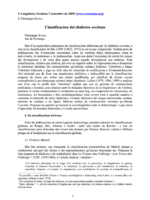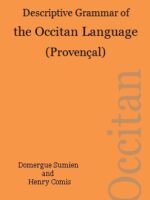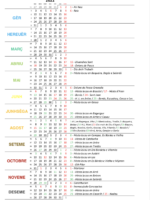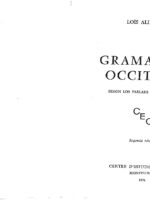Recommended Books
-
Classificacion dei dialèctes occitans
0,00 €Mai d’un especialista prepausan de classificacions diferentas per lei dialèctes occitans, e mai se la classificacion de Bèc (1995 [1963], 1973) es uei la pus vulgarizada. Tanben pron de publicacions fan d’omissions recurrentas subre de varietats fòrça interessantas coma lo sud-vivarés, lo mentonasc o lo judeooccitan. Aquò nos dona l’escasença de cercar lei causas dei divergéncias e de veire dins quina mesura aquelei divergéncias son relativas. Tota classificacion, relativa que relativa, pòt aver un impacte subre lei representacions e dramatizar lo sentiment identitari dei renaissentistas qu’utilizan certanei dialèctes. Contribuís a fargar l’identitat dialectala e jòga un ròtle dins lei chausidas de codificacion e d’estandardizacion. Aicí pretendi pas de fixar una arquitectura definitiva e indiscutibla per la classificacion: prepausi de pistas per trobar una sintèsi equilibrada, per clarificar de tèrmes sovent contradictòris e per desmontar certanei mites identitaris. Lafont (1979, 1996, 1999) a explicat mai d’un còp lo perilh deis “identitats” rigidas que son en generau de construccions artificialas e recentas, sens relacion amb lei donadas objectivas de la lingüistica e de l’istòria; pasmens lo mitan renaissentista (o occitanista au sens larg, en comprenent lei classicistas, lei mistralencs, lei bonaudians e leis escòladaupoïstas) rèsta sovent sord a aqueleis analisis e contunha d’entretenir de mites dialectaus. Certanei defensors dei lengas minorizadas vesinas, subretot de catalans e de ligurs, fabrican tanben de construccions erronèas qu’afèctan l’occitan. Prepausi un apròchi qu’assòcia la sociolingüistica amb la dialectologia1 e que cèrca d’apreendre lei donadas dialectalas a l’escala panoccitana.
-
Descriptive Grammar of the Occitan Language (Provençal)
0,00 €Like Old French, from the 9th to the 13th century, Old Occitan preserved the two-case system of Vulgar Latin, subjective and objective, and it seems that until the middle of the 12th century, the written and spoken languages were identical. Then, the distinction between the cases disappeared in spoken usage, though they still persisted in the written texts of the Trobadors. This period can be qualified as the Golden Age or the time of the Trobadors.
A second period ranges from the beginning of the 14th century to the middle of the 16th. It is characterized by the dropping altogether of the flexions in witten texts, by the beginning of dialectization, the dropping of courteous vocabulary and the use of learned words borrowed from Latin and Greek to express law, medecine, philosophy and theology. Occitan was no longer a literary language, but it was used to write the deeds, the accounts, the chronicles and the resolutions of local communities. Since the second half of the 16th century to our days, Occitan was banned from written documents, and reduced to oral usage only, mainly by country and working people, in their everyday life, at work or at home.





